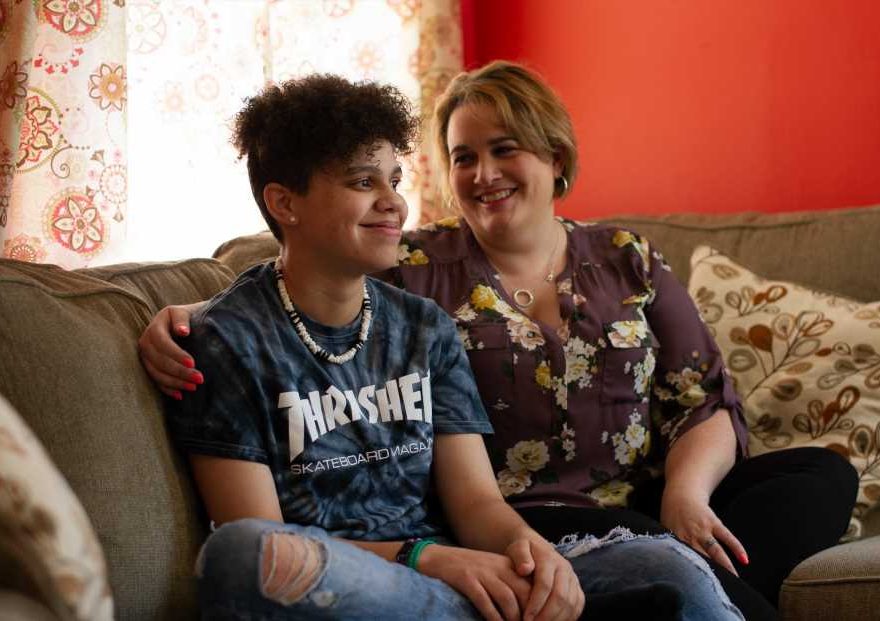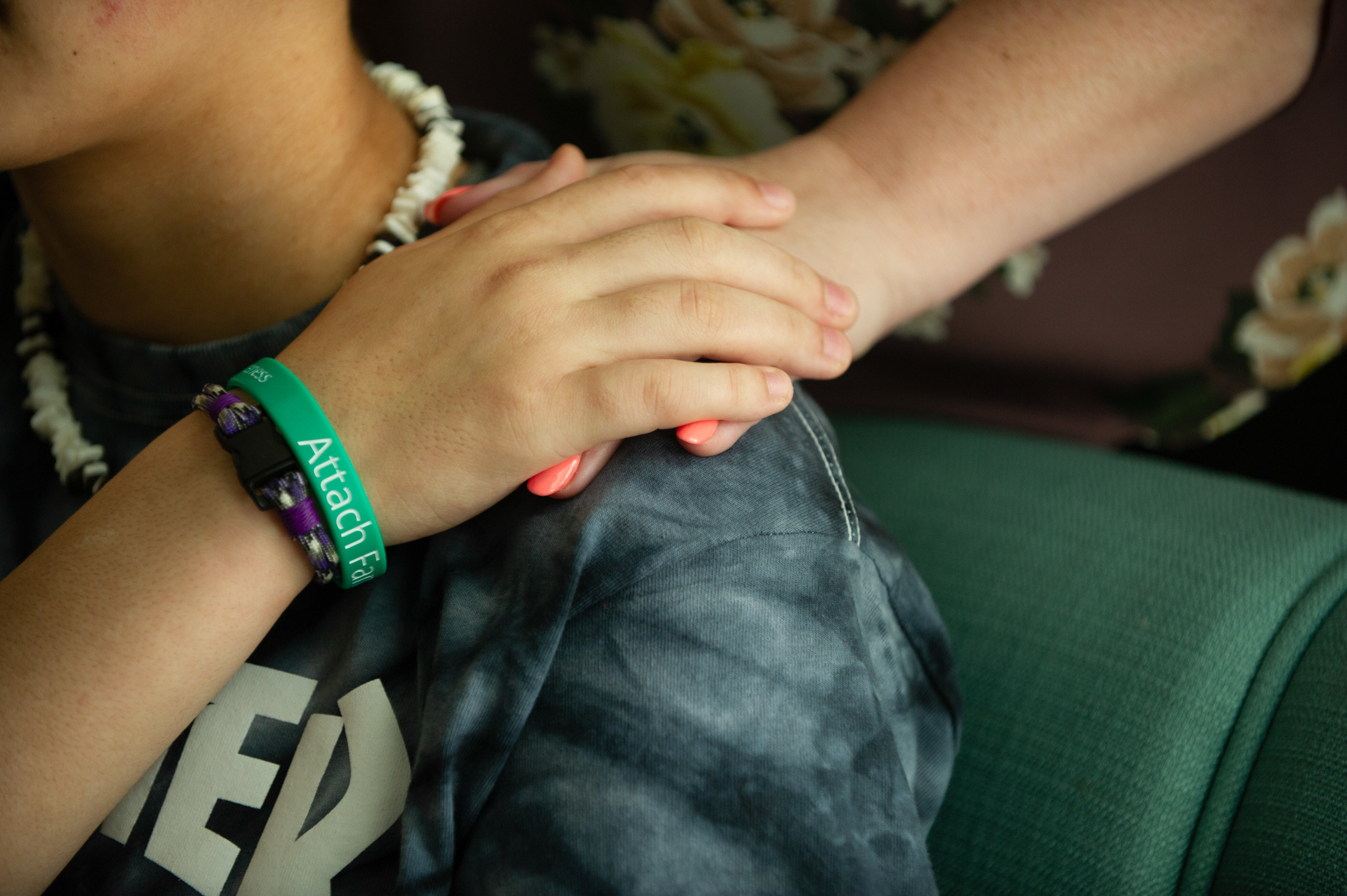
Keri Williams and her daughter Kayla Williams at home in Charlotte, North Carolina.
Late one night a few years ago, my 14-year-old daughter, Kayla, texted me.
911 Kayla: i need to talk to u
She’d prefixed her contact name in my cellphone to read “911,” a way of asserting her significance in my life. Seeing it always made me smile. It was after midnight, but I dutifully responded.
Me: Can we talk tomorrow? You have school in the morning.
911 Kayla: stop using punctuation in texts its weird
Me: It’s not weird.
911 Kayla: ur such a mom
Text bubbles danced for long moments on my screen before her next message popped up:
911 Kayla: i don’t know how to tell u this but im gay
I blinked. My finger hovered uncertainly over my iPhone screen as I read and reread her text.
My husband and I had adopted Kayla and her brother, Devon, out of foster care over a decade earlier. When she first came to live with us, she was 2, with dimples, gobs of curly hair, and an offbeat sense of humor. Her freckle-faced brother, Devon, was 3. Kayla didn’t yet have a conscious awareness of her sexual identity, and it didn’t occur to me she might be gay. I was far more concerned about her low self-esteem and difficulties with attachment as she adjusted into our family.
I was raised in the heady, evangelical Christian movement of the ’80s and ’90s. For many years, I unquestioningly accepted the belief that homosexuality was wrong and a behavioral choice, but during my thirties, I became disenchanted with the religion of my youth. I reconsidered the tenets of my faith and the shortfalls of organized religion and its anti-abortion, anti-gay, pro-gun political agenda.
During that time, my conservative ideology shifted, including my stance on LGBTQ issues. I worked from home and often chatted over IM with my coworker Brian about our kids. He had an adopted teenage son, a few years older than my kids, and was the most devoted and involved dad I knew. I imagined his family — his wife and son — to be happy and close just like my own family.
But Brian didn’t have a wife. I eventually discovered he had a partner named Chris. They’d been together for more years than most married couples I knew, defying the evangelical stereotype of gay men as unfit parents, incapable of monogamy. Despite the prejudice against same-sex couples, they were successfully raising a happy and healthy adopted son. Witnessing this reality, I was compelled to evaluate my beliefs about the LGBTQ community and my positions on issues like gay marriage and adoption.
After years of soul-searching, I left the evangelical church behind. I embraced a more progressive Christianity — one that would prepare me for the late-night texting with my daughter only a couple years later.
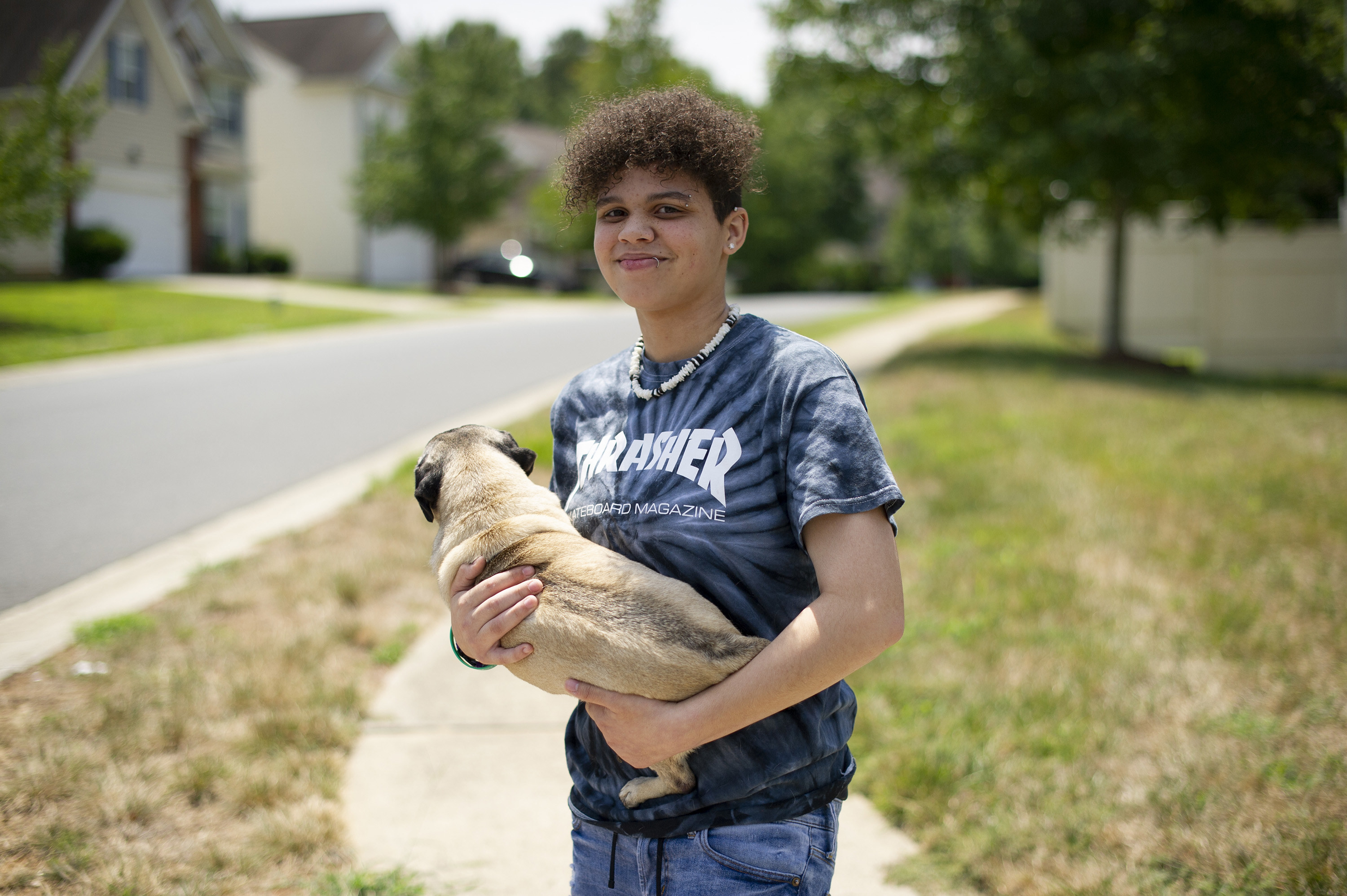
Portrait of Kayla Williams and her dog, Pocket, in her Charlotte home on July 28. Pocket can only walk for a little bit, so Williams often carries her most of the way.
That night, when Kayla nervously texted me, I wasn’t conflicted about her sexuality. The only reason my finger hovered over my iPhone screen was that I wasn’t sure how to formulate a response that would adequately assure her of my love and acceptance.
Afraid to let the seconds stretch into a message of their own, I responded:
Me: I will always love you. I’m fine with you being gay.
Kayla has since had two girlfriends and has come out to friends and family. As I’ve watched her blossom into her authentic self, I’m haunted by how things could have gone so differently for her if my religious convictions had not evolved.
Our situation is not unique. According to the Adoption Network, there are 135,000 children adopted each year, most from foster care, like Kayla was. And based on a 2014 UCLA School of Law study, more than 1 in 5 kids in the foster care system is LGBTQ.
Conservative Christians are the religious group most likely to adopt, but also the group most likely to oppose homosexuality. Many Christian adopters are licensed by faith-based agencies like the one I adopted through.
These agencies, which historically do not work with LGBTQ couples, are the cornerstone of the child welfare system in the US. For example, according to a 2017 story in the Arkansas Times, a single faith-based organization recruits over half the state’s foster homes. Faith-based agencies’ ubiquity has led to ongoing legal battles over whether faith-based agencies who refuse to work with same-sex couples should continue to receive government funding.
In the meantime, LGBTQ adoptees placed in anti-gay families by faith-based agencies face all sorts of difficulties — and significant long-term impacts to their health and well-being.
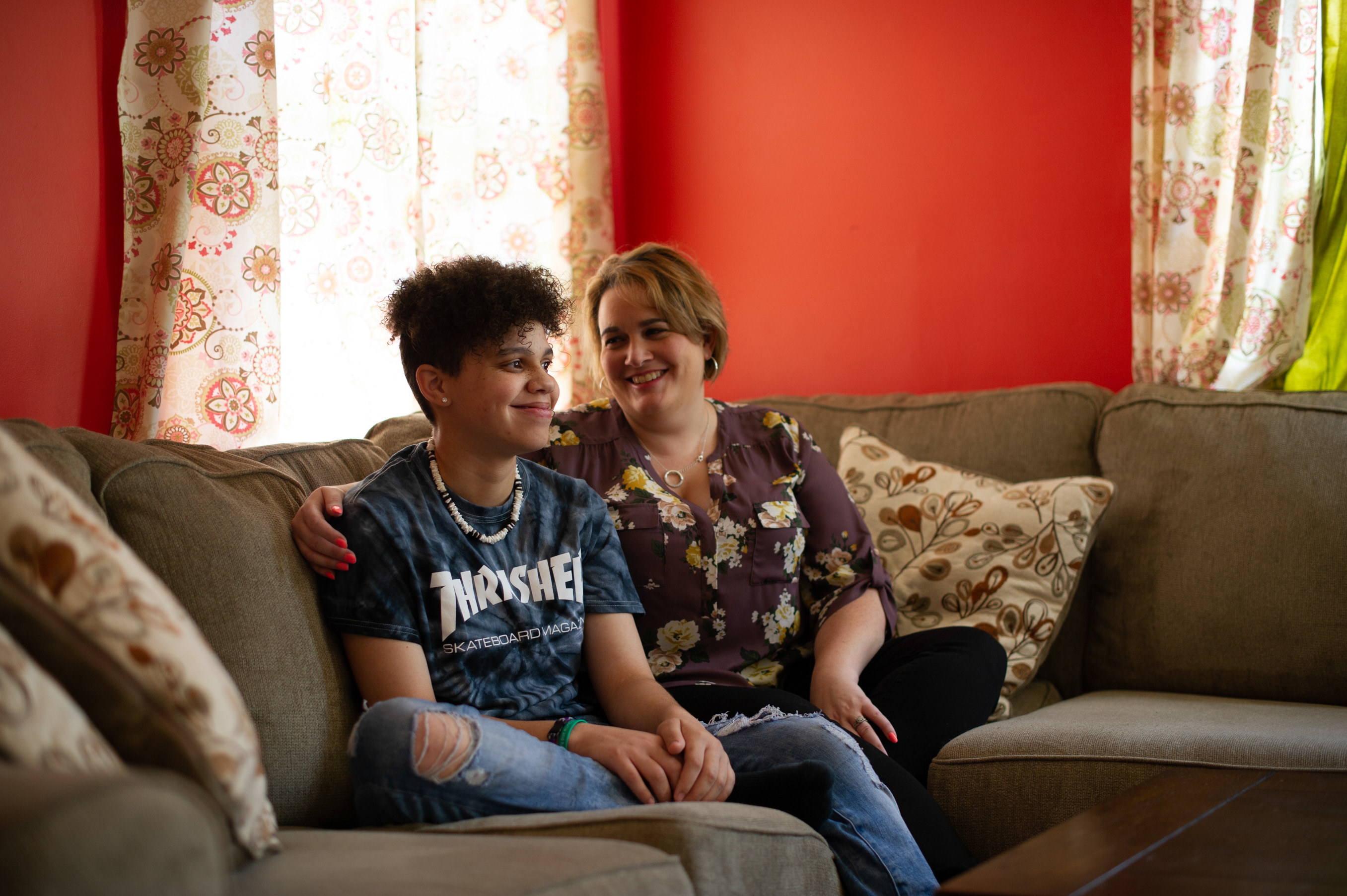
Keri Williams (right) and her daughter Kayla Williams in their Charlotte home on July 28.
Every adoption, no matter how positive, starts with separation and loss. Some situations are more challenging than others. For example, children adopted out of foster care or orphanages may have been neglected, abused, or abandoned. According to a report by the Child Welfare Information Gateway, trauma like this, especially during the first five years of life, when the brain is most vulnerable, can cause a child’s brain not to develop optimally.
“Children who are abused and neglected early in life can internalize loss and betrayal. They view the world as unsafe and unpredictable,” say Forrest Lien of Lifespan Trauma Consulting. “Adoption doesn’t erase these impacts. Even in the most nurturing and loving of homes, healing these deep hurts takes years as well as effective professional intervention.” Research shows children with early childhood trauma are at higher risk for substance abuse, incarceration, mental health issues, and chronic physical diseases than their peers.
Adoptees have a lot stacked against them even if they don’t have to wrestle with their sexual identity in a family that might be anti-gay. “A sense of rejection is already present for the adopted foster child. Being rejected for a fundamental part of ‘self’ cuts even deeper,” explained Kelly Crenshaw, a reverend based in Maryland who advocates for LGBTQ youth. “It’s another piece of baggage to carry through life that just makes things more complicated: Are people going to accept me? Will I be allowed to date? Do I have to hide my real self? What if my family doesn’t want me anymore?”
When we went through the process to adopt Kayla, a toddler at the time, our Christian agency didn’t ask how we would feel if we later discovered she was LGBTQ. Like Kayla, many children are adopted too young to be aware of their sexual orientation or gender identity, and it’s the furthest thing from the minds of their adoptive parents when they jump in heart-first.
That said, conservative Christians don’t necessarily shy away from adopting children who think they are gay. Many view homosexuality as a behavior they can help the child overcome — like overeating or lying. These adopters are confident that with proper parenting and religious instruction, they can keep their child from the “homosexual lifestyle.” This is the sincere, albeit ignorant, belief of most conservative Christians.
Unfortunately, even the most sincere convictions, by the most well-intentioned people, can be incredibly damaging.
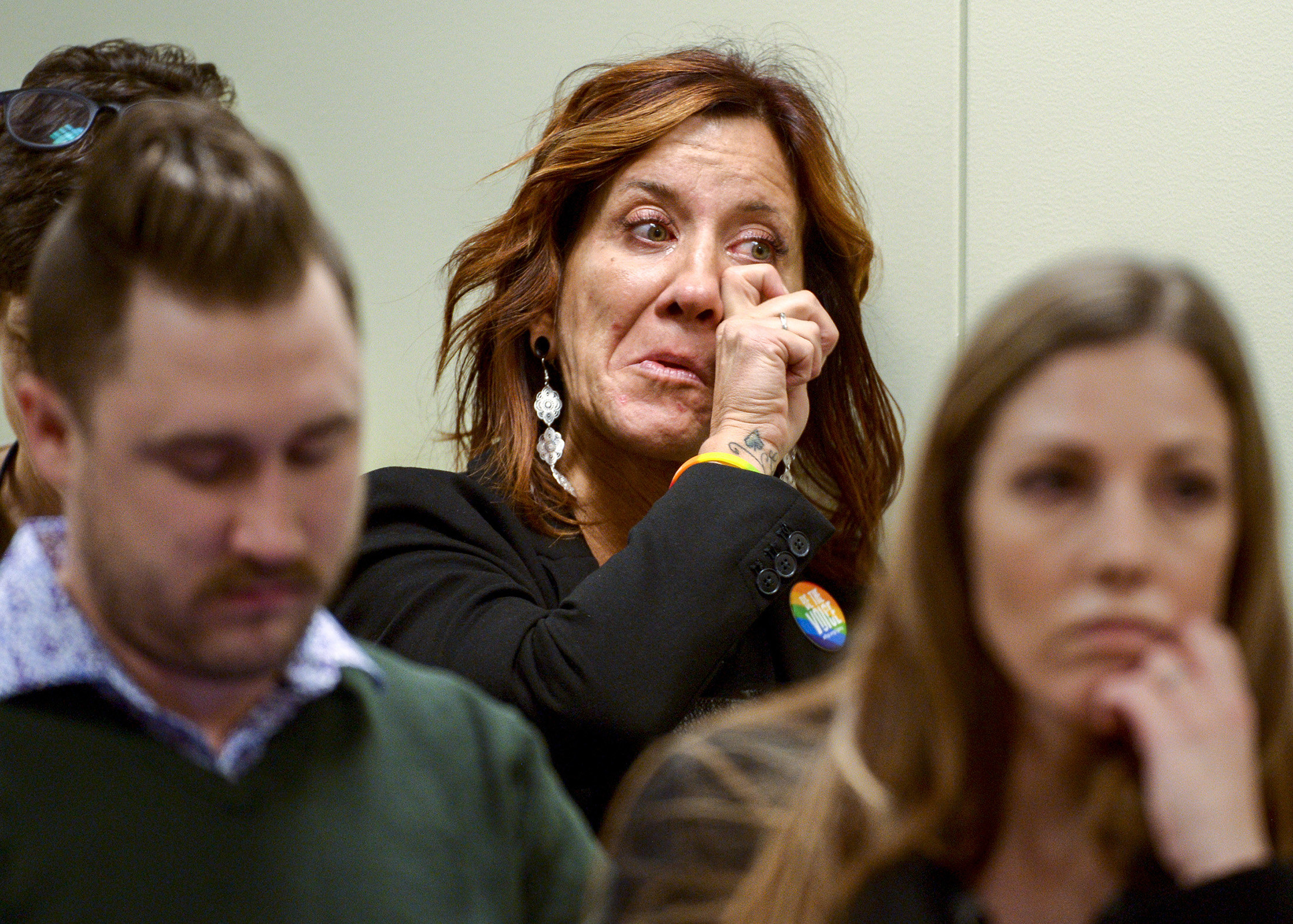
Taryn Hiatt, Utah and Nevada chapter director with the American Foundation for Suicide Prevention, wipes away tears as members of the House Judiciary Committee opt to modify the conversion therapy bill in Salt Lake City on March 5.
Alex was adopted into a loving family and attended a Christian school from kindergarten through 12th grade. He appeared to have it all — a private school education, devoted parents, and the affluence to go on expensive vacations. Alex was also gay.
He first began to grapple with his sexual identity in third grade when his Christian school classmates mocked his seemingly effeminate behavior. Even though he knew he likely was gay, he sensed it was something to be ashamed of. He’d heard his mother make snarky comments like, “Don’t act like such a girl.” And in school and church, the message was loud and clear: Christians can’t be gay.
Alex became convinced something was intrinsically wrong with him. He was uncomfortable at school, church, and home. “I didn’t want to be gay. For the longest time I suppressed who I was. I tried to ignore it,” he told me in an interview in June. “I would pray about it and beg God to change me.” He even tried masturbating while imagining girls, but nothing worked.
In high school, Alex’s teacher cornered him one day after their Marriage and Family class. She had spent the last few weeks teaching about “the life cycle of the homosexual man” and the unavoidable, tragic consequences faced by those who acted on same-sex attraction. She asked Alex if he was struggling with homosexual feelings and said it was common for adopted kids, especially if they had domineering mothers and passive fathers. While pressuring him to confess, the teacher assured Alex that he could be fixed.
Despite her persistence, Alex adamantly denied he was gay. After all, the “fix” for gayness would have included prayer, Bible study, being forced to embrace “correct” gendered behavior, and school discipline — including possible expulsion.
These are common approaches among many conservative Christian parents, churches, and other institutions. Focus on the Family, an evangelical organization that’s a leading authority in conservative Christian circles, says on its website, “Homosexual behavior is just one of the many sins God forgives and brings people out of.” Based on this ideology, some evangelical parents may enroll their LGBTQ kids in classes or programs designed to help those “confused about their sexuality” accept “God’s best” for their lives — heterosexuality.
Conversion therapy is another destructive practice, explored in recent films like Boy Erased and The Miseducation of Cameron Post. While the recently reintroduced “Every Child Deserves a Family Act” includes protections to safeguard adopted children from conversion therapy, it continues to be a frightening option in most states.
According to the Trevor Project, the world’s largest suicide prevention and crisis intervention organization for LGBTQ young people, these damaging practices are startlingly common. “In some cases, adoptive parents who are not supportive of their LGBTQ children may attempt to change their sexual orientation or gender identity,” says Amy E. Green, director of research for the Trevor Project. “In fact, 2 in 3 LGBTQ youth reported that someone tried to convince them to change their sexual orientation or gender identity, which resulted in almost triple the rate of youth attempting suicide in the past year.”
Alex kept his secret throughout high school and only began to understand being gay wasn’t dirty or wrong when he was exposed to a wider swath of people and ideas during college. He began to live openly with his friends but still kept the secret from his parents. He says, “I was nervous if they found out, they’d cut me off and I’d be on my own. I avoided spending a lot of time with them because I had to act differently around them. I was always afraid of slipping up.”
Now 23 years old, Alex has earned a college degree and recently started a new job. He asked that I not use his real name for this story because he still hasn’t come out to his adoptive parents. He is uncertain what their response will be but says he won’t breathe easy until he knows he’s able to independently support himself.
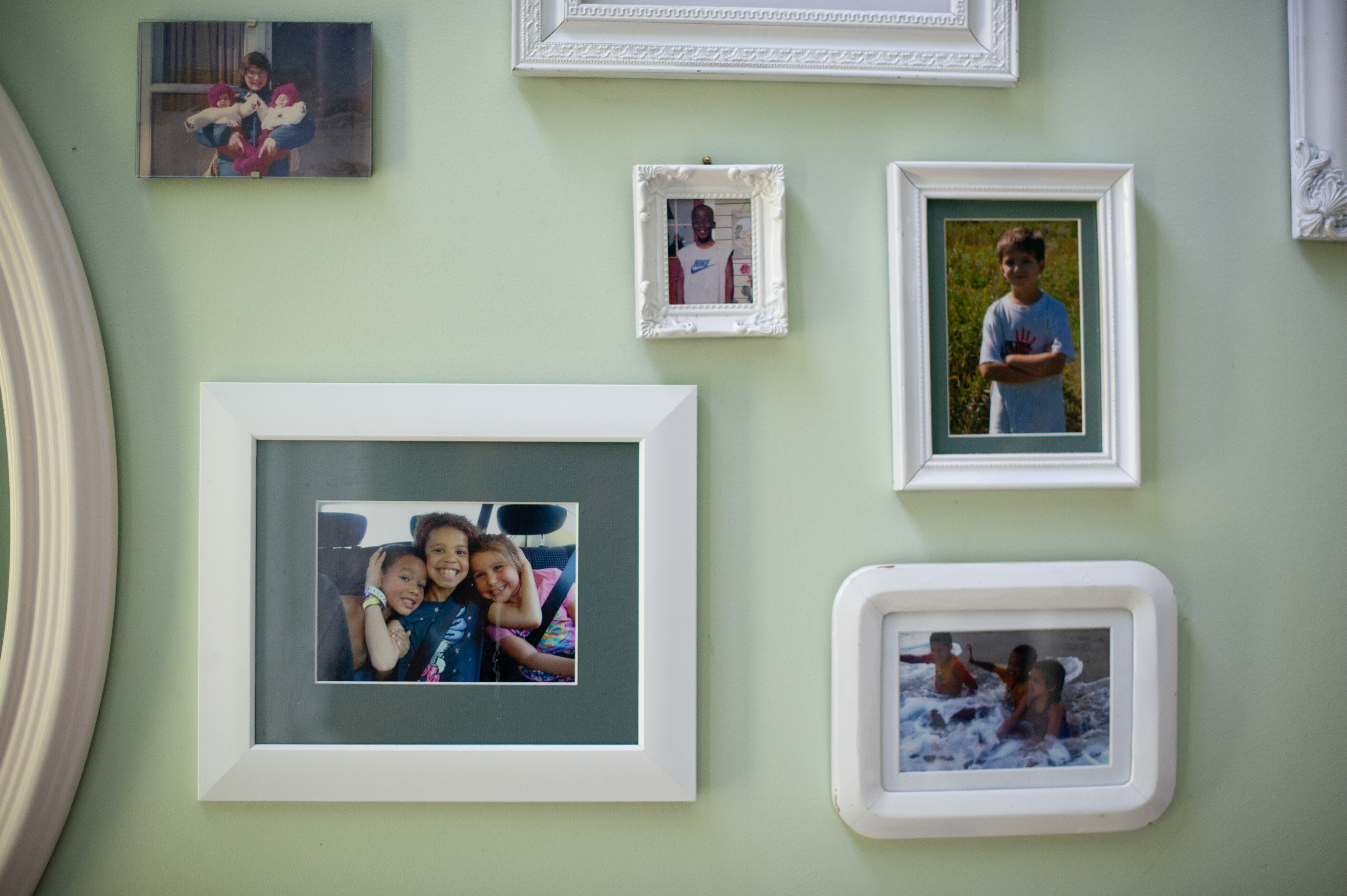
Family photos line the walls of the Williamses’ home in Charlotte.
According to a 2015 Pew Research survey, only 30% of the members of the largest Protestant denomination, the Southern Baptists, believe homosexuality should be accepted in society. This statistic might drop even lower if the respondents were asked if they believe homosexuality should be accepted in their own family.
“When LGBTQ young people see their sexual orientation or gender identity up for public debate using harmful rhetoric, they can feel that their lives are worth less than their straight or cisgender peers,” says Green. The statistics bear this out with disproportionately higher suicide rates and soaring homelessness among LGBTQ youth.
“Until they really get to know LGBTQ people — including LGBTQ Christians — and hear our stories, some Christians have mistaken beliefs about us and our lives,” says Justin Lee, an LGBTQ Christian activist and the author of 2012’s Torn: Rescuing The Gospel From the Gays-vs.-Christians Debate. “In many cases, they think they’re showing ‘tough love’ and actually helping us with their hurtful language. But because they’ve never walked in our shoes, they don’t realize how their words push people away from their own families and even from their faith.”
Over the last handful of years, many conservative Christian churches and institutions have recognized how alienating their anti-gay agenda can be and have consequently changed their language around the issue. Some nonaffirming church denominations, including the International Pentecostal Holiness Church, Southern Baptist Convention, and Assemblies of God, offer programs for those struggling with “unwanted” same-sex attraction but are unwilling to accept for membership those who are out and plan to remain so.
Others, like the popular megachurch Hillsong, “welcome” members of the LGBTQ community, while not actually affirming them. LGBTQ people are encouraged to attend, but they cannot occupy roles of leadership in the church. And while Hillsong does not list its belief that homosexuality is sinful clearly on its website, it is documented in its statement of faith. While the language used by some of these churches has changed, their fundamental beliefs have not.
These same churches are active in the adoption movement. Crenshaw said, “I believe that many people honestly desire to help neglected and abused children. And many of those who want to help come from faith communities that promote reaching out into their communities. Unfortunately, many of these faith communities turn out to be among the more conservative of our Christian brothers and sisters.”
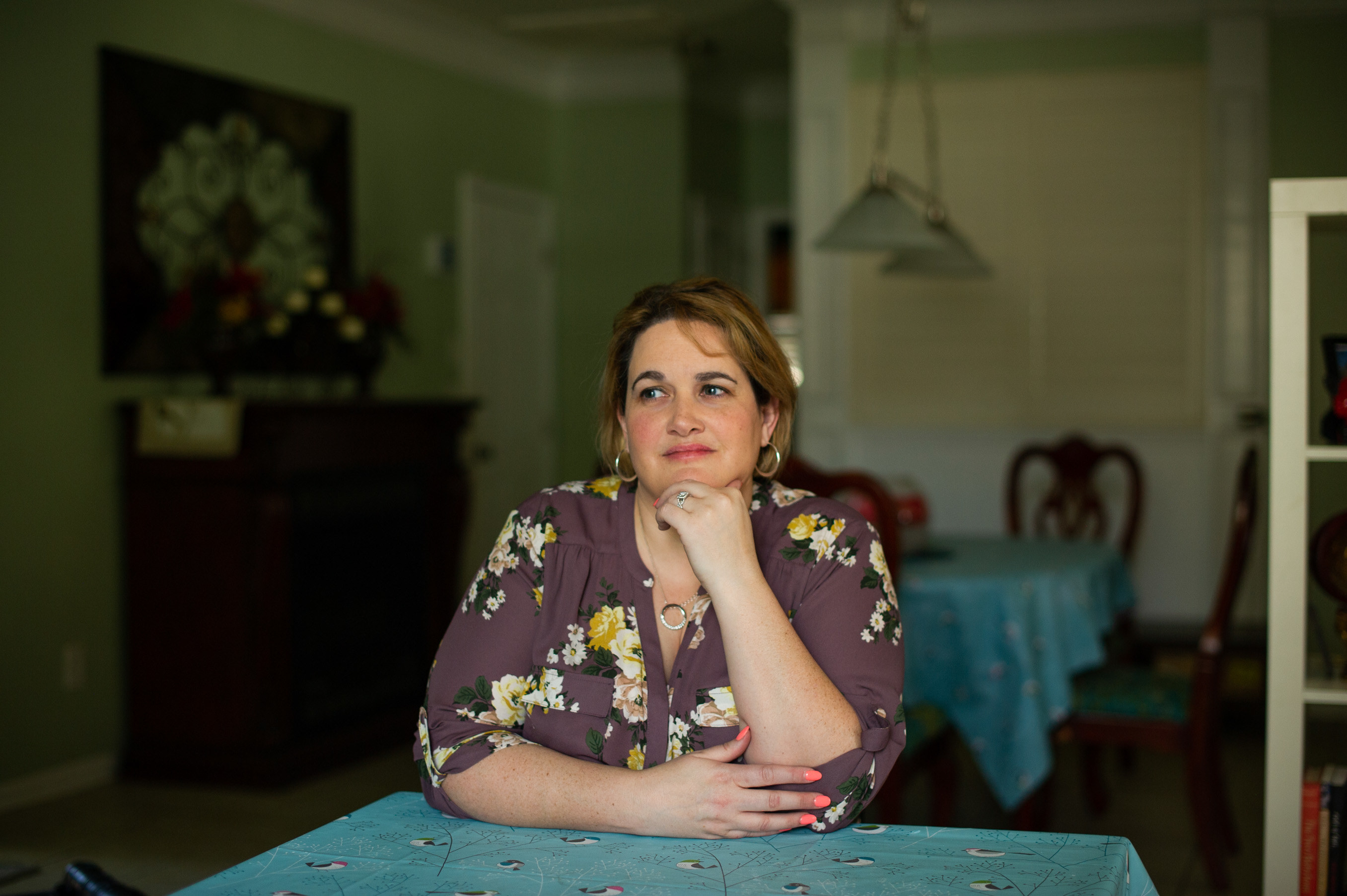
Keri Williams in her home in Charlotte.
Like many Christians, I became a foster parent and later adopted based on an appeal from the pulpit. The pastor of our Florida megachurch called on the congregation of more than 20,000 to single-handedly end the “orphan crisis” in our county by becoming foster parents or adopting.
The adoption mandate for Christians is rooted in James 1:27, which says pure religion is caring for orphans in distress. Many Christians view adoption as a way to walk out their faith. In addition, adoption is considered a way to offer a religious upbringing to adoptees.
Christians began to champion adoption in the early 2000s by forming adoption ministries and throwing their support behind faith-based agencies, including the agency I used. Over time, they’ve come to monopolize the adoption market, given their access to highly motivated and passionate recruits. This led to a boom in expensive and ethically dubious international adoptions, which tapered off over the last decade due to new international restrictions. However, Christians remain passionate about adopting, particularly adopting children domestically out of foster care.
Churches and faith-based organizations provide valuable support — often not found elsewhere — to adoptive families, including childcare and financial services, support, community groups, and advocacy. Each year, thousands of well-meaning Christians invest their money, time, energy, and other resources into adoption.
However, their compassion is lost in translation when it comes to LGBTQ young people. “They often don’t realize how much pain they’re inflicting on LGBTQ people by refusing to accept them, but they are. It’s incredibly damaging,” says Lee.
Comedian Joel Kim Booster was born in South Korea and adopted as an infant by a conservative Christian couple from the Midwest. When Booster realized he was gay as a young child, he knew his parents would not be accepting. “I had no idea what their response would be,” he says, “but when you’re 16, you sort of assume the worst. That was the narrative at the time around conservative parents: They find out, they kick you out, and you’re fucked, or they send you to conversion therapy and you’re fucked in a whole different set of ways. I was worried about both of those outcomes.” Once they found out, Booster knew the relationship was too toxic to remain living at home, so he left.
Far too often, adopted LGBTQ children, like Booster, become the collateral damage of the anti-gay convictions of their well-meaning Christian parents. “I have worked with so many kids and teens who don’t fit in with the parents who raise them,” says Crenshaw. “They did their best to fit in, but like a square peg in a round hole; it never quite worked out.”
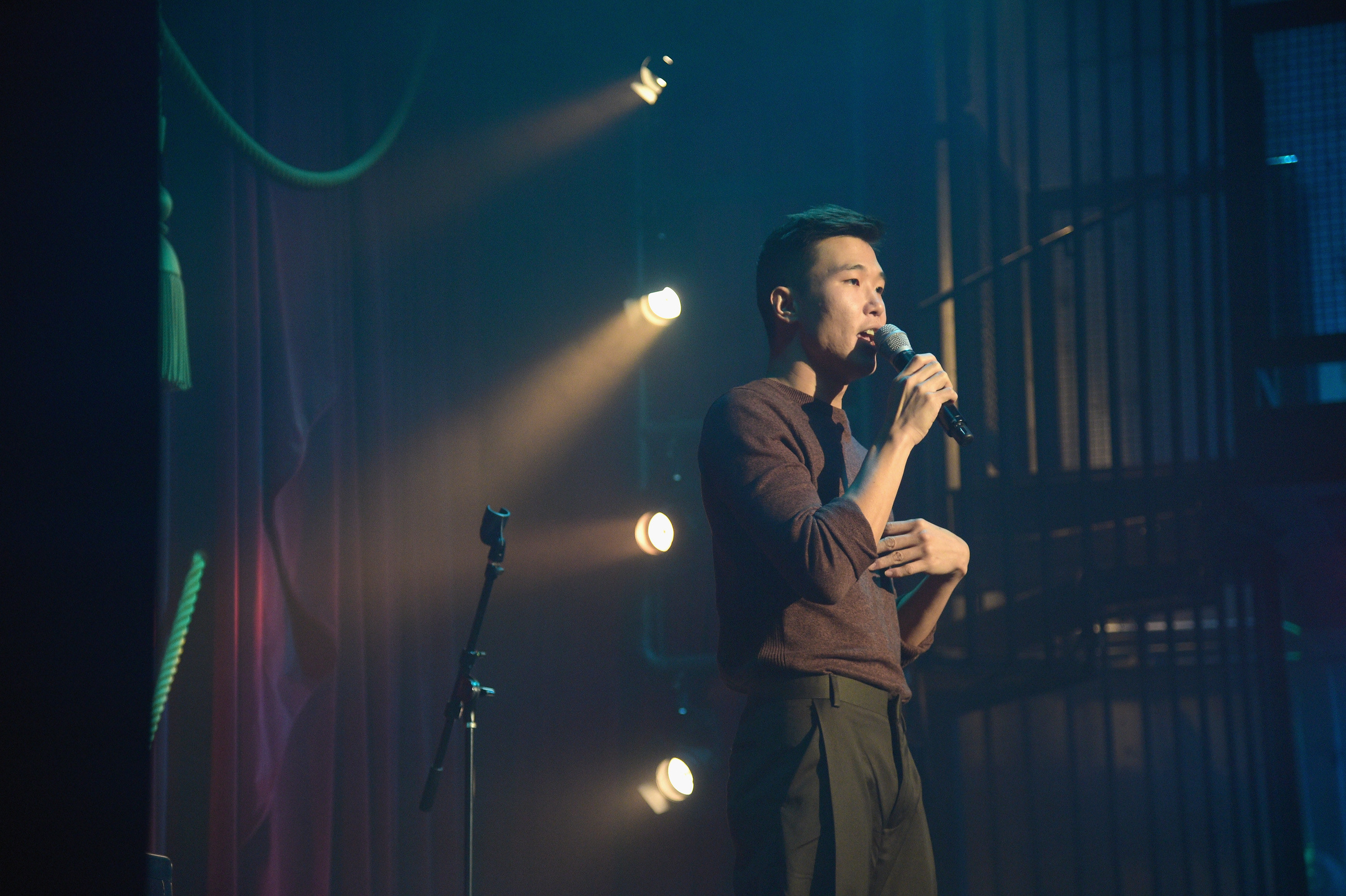
Comedian Joel Kim Booster performs onstage during the TBS Comedy Festival in 2017.
It’s difficult to come up with an easy solution for adopted LGBTQ kids in nonaffirming, conservative Christian families. Booster recognizes this problem and says of his own adoptive parents, “Them handling things differently would’ve meant them drastically altering their worldview, and that’s a big ask of someone.”
Now that children are coming out as LGBTQ at younger and younger ages, many are actively exploring their sexual orientation or gender identity when they are adopted. If we had known Kayla identified as LGBTQ when we first adopted her, what might we have done with that information? Using an ideological standard to approve adoptive parents is a slippery slope, akin to what faith-based agencies have done by excluding same-sex couples from adopting. Furthermore, there are ethical and practical concerns with collecting information about the sexual orientation of kids who are being adopted.
The Family Acceptance Project (FAP) of San Francisco State University is working to change the discourse around LGBTQ acceptance from “right and wrong” to “health and wellness.” Its evidence-based research has shown this can protect the well-being of LGBTQ youth even in families where the parents believe homosexuality is wrong.
“We have found that families can learn to support their LGBTQ children when information is presented in ways that resonate with their values and beliefs — to protect their children and to help them have a good life, to strengthen and keep their families together. In essence, what we have done is to give families a different way of thinking about their LGBTQ children by shifting the discourse on homosexuality from morality to health and well-being,” wrote FAP’s director, Caitlin Ryan, in a 2014 report.
Lee grew up in a Southern Baptist family and remains a devout Christian. He educates conservative Christian parents about the needs of their LGBTQ children and is hopeful there is a way forward for these families. He says, “Parents and children may not always agree on morals and theology, but they can still have a healthy relationship if they have healthy, open lines of communication.”
With hundreds of thousands of children waiting in foster care to be adopted, and thousands of conservative Christian families stepping up to help, these are the types of approaches needed to ensure LGBTQ adoptees grow up in healthy and nurturing homes.
I’m glad Kayla felt safe to come out to me, even if it was through a late-night text message. Now 16, she says, “First I told some of my friends and then my brother. I wanted to tell you because I felt uncomfortable whenever you talked about me dating boys. It was hard because it’s a big thing and I didn’t know what you would say.”
Kayla told me she’s relieved she doesn’t have to hide being gay from me because she’s seen how it affects her LGBTQ friends. “It stressed me and my ex-girlfriend out because her parents don’t know she is gay. She feels like she can’t tell them until she is able to move out.”
Coming out can be a scary moment for any young person, but even more so for adopted kids. By coming out, they risk losing their tenuous, budding relationships with new family members. They may be risking everything.
Alex says he’s felt emotionally disconnected from his parents for a long time. “Our relationship could have been different if I didn’t have to hide who I was. No kid deserves to live in a family where they aren’t accepted and loved for who they are.” ●
Keri Williams lives in Charlotte, North Carolina, with her family. She’s a mental health and adoption advocate. She blogs at www.raisingdevon.com and you can find her on social media @RaisingDevon.

Keri Williams is a mental health and adoption advocate who lives in Charlotte, NC with her family.
Contact Keri Williams at [email protected].
Got a confidential tip? Submit it here.
Source: Read Full Article
